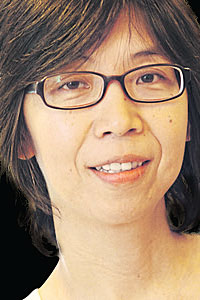Last month I had the chance to travel to Mae Hong Son, where I had a chance to visit the IT Valley project there.
Though the IT Valley project may not be widely recognised, I found the model of the initiative efficient in delivering a positive impact to the community.
It's an effort made by a group of people, in and outside the province, to have the new generation growing up with an education and not moving to work somewhere else.
For students in the remote mountainous province, the project helps open their view of professions in the IT field.
Some who went through the programme a few years ago are now studying computer programming, and others media arts. All were inspired by their experiences in the IT Valley camp. I had a chance to witness their presentations, which are part of the programme, in which the 12th-graders presented their projects to the committee, based on the theme "Good Things in My Home".
Some chose to create motion graphics; others worked on short films, programming, websites and e-books. Students looked joyful and self-confident as they presented their work. Interestingly, the content associated with local wisdom seamlessly integrated with digital technology.
The students used local traditions and values (recipes for food, traditions, musical instruments) and applied to them techniques they learned in the camp. It was fascinating to me, as it portrayed parts of a culture I'm not fully accustomed to.
Kids in remote areas are not less intelligent than those who grow up in cities, but they do lack opportunity.
Projects like IT Valley offer knowledge and tools to the less privileged through the collaboration of agencies in the public and private sectors, allowing the area's children to have a place where they can hone their skills and talents, cultivate pride in their ethnic backgrounds and realise the value in their traditional cultures.
And they can do it while remaining in their hometowns, earning a living in technological fields without relocating to large cities such Chiang Mai, Chiang Rai or Bangkok.
Bangkok is regarded as the country's centre of modernisation. It is the source of development for many industries, a place where people from upcountry flock each year to find work.
But outside of Bangkok, each province has its own unique characteristics. Mae Hong Son's population, for instance, is 80% ethnically Tai Yai. I don't think people from upcountry would want to move away from their homes if there were sufficient facilities available for jobs in their chosen field, especially in regards to educational resources.
We can no longer depend solely on governmental action (even though it is the government's responsibility to decentralise industry development).
Mae Hong Son is a perfect example of the fact that local people are waiting government funding and are also determined to develop their own provinces, thereby strengthening the local economy.
Educational development needs time to prove whether it will be successful.
If it is, then it is truly worth the effort.
Offering tech industry job opportunities is one helpful strategy to improve its chances.
And with the power of cloud computing technology, too, people are able to work anytime, anywhere.
Sasiwimon Boonruang is a writer for the Life section of the Bangkok Post.
